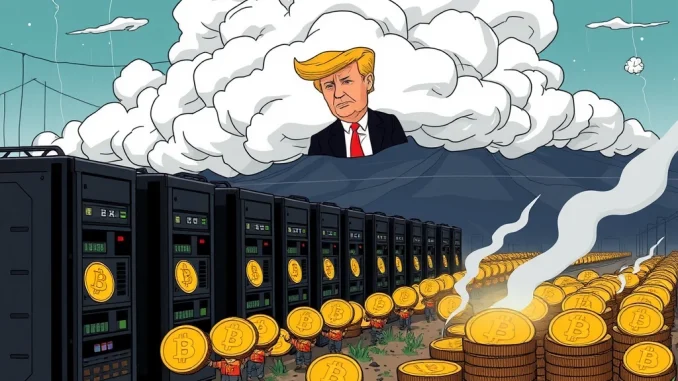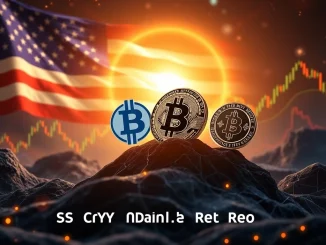
A chilling forecast has emerged from the Bitcoin mining sector, casting a shadow over the industry’s future in the United States. Kristian Csepcsar, a leading voice from Bitcoin mining tech firm Braiins, has issued a stark warning: former U.S. President Donald Trump’s newly imposed tariffs could significantly worsen the already challenging Bitcoin mining outlook. This development raises serious questions about the competitiveness of American miners on the global stage and the future landscape of cryptocurrency mining.
Trump Tariffs: A Looming Threat to Bitcoin Mining?
The core of the concern lies in the intricate global supply chain that underpins Bitcoin mining. Csepcsar, in a recent interview with Cointelegraph, highlighted the stark reality that complete localization of this supply chain within the U.S. remains an insurmountable task. This dependence on international components means that tariffs, essentially taxes on imported goods, directly impact the cost of setting up and maintaining mining operations. But how exactly do these tariffs translate to a problem for the industry?
- Increased Operational Costs: Tariffs on essential mining equipment, much of which is manufactured overseas, directly inflate the capital expenditure for U.S. miners. This makes it more expensive to start or expand mining operations.
- Reduced Profitability: Higher costs eat into profit margins. In a highly competitive industry like Bitcoin mining, even slight increases in expenses can make a significant difference in profitability, potentially pushing some miners out of business.
- Competitive Disadvantage: When U.S. miners face higher costs due to tariffs, they become less competitive compared to miners in regions with lower or no tariffs. This could lead to a migration of mining operations away from the U.S.
Csepcsar emphasizes that these tariffs aren’t just a minor inconvenience; they represent a significant headwind for the domestic cryptocurrency mining industry, potentially reversing any progress made in establishing the U.S. as a major player in this space.
The Unfolding Impact on the Bitcoin Mining Industry
The implications of these tariffs extend beyond just increased costs. They touch upon the very structure of the Bitcoin mining industry and could trigger a shift in global mining power dynamics. According to Csepcsar, the current tariff regime could inadvertently harm domestic miners while simultaneously benefiting regions with more favorable economic conditions. Let’s delve deeper into this potential reshuffling of the deck:
| Region | Tariff Situation | Potential Impact on Bitcoin Mining |
|---|---|---|
| United States | New tariffs imposed | Increased costs, reduced competitiveness, potential industry strain |
| Russia & Kazakhstan | Lower tariffs, favorable energy costs | Potential influx of mining operations, strengthened regional dominance |
| Other Regions (e.g., Southeast Asia) | Varying tariff levels | May become more attractive destinations compared to the US depending on specific tariff policies |
Regions like Russia and Kazakhstan, with their lower tariff barriers and often more affordable energy resources, are poised to become even more attractive destinations for Bitcoin mining operations. This could lead to a scenario where the U.S., instead of becoming a hub for this burgeoning industry, finds itself lagging behind, losing out on potential economic benefits and technological advancements.
Chip Production: The Achilles’ Heel of US Bitcoin Mining?
Beyond tariffs, Csepcsar also pointed to a fundamental weakness in the U.S.’s position in the Bitcoin mining ecosystem: advanced chip production. Mining Bitcoin requires specialized hardware, Application-Specific Integrated Circuits (ASICs), which are essentially highly advanced computer chips. The U.S., despite its technological prowess in many areas, currently lags behind other nations, particularly in Asia, in the production of these cutting-edge chips.
Csepcsar estimates that it could take the U.S. a decade – a substantial amount of time in the rapidly evolving tech world – to catch up in advanced chip manufacturing. This lag presents a dual challenge:
- Dependence on Foreign Chip Suppliers: U.S. miners are forced to rely on overseas suppliers for the most crucial component of their operations, making them vulnerable to global supply chain disruptions and geopolitical factors.
- Innovation Bottleneck: Without domestic advanced chip production, the U.S. risks falling behind in the innovation race within the Bitcoin mining hardware sector. The most efficient and powerful mining equipment will likely continue to originate from regions with leading chip manufacturing capabilities.
This reliance on foreign chip production, coupled with the newly imposed tariffs, paints a concerning picture for the long-term health and growth of the Bitcoin mining industry in the United States.
Navigating the Tariff Terrain: Actionable Insights for Bitcoin Miners
While the situation may seem bleak, it’s crucial for Bitcoin miners and stakeholders to understand the challenges and explore potential strategies to navigate this evolving landscape. Here are some actionable insights:
- Advocate for Policy Change: Industry participants should actively engage with policymakers to highlight the detrimental effects of tariffs on the Bitcoin mining sector and advocate for more favorable trade policies.
- Explore Supply Chain Diversification: While complete localization might be impossible, exploring diversification of supply chains and identifying potential alternative component sources could mitigate tariff risks.
- Focus on Efficiency and Innovation: In a higher-cost environment, focusing on operational efficiency, energy optimization, and technological innovation becomes even more critical for survival and profitability.
- Consider Strategic Relocation: For some miners, especially larger operations, strategically relocating a portion of their operations to regions with more favorable tariff and energy conditions might be a necessary consideration to maintain competitiveness.
The path forward for U.S. Bitcoin mining in the face of tariffs is undoubtedly challenging. However, by understanding the complexities of the situation, taking proactive steps, and fostering innovation, the industry can strive to mitigate the negative impacts and potentially carve out a sustainable future.
Conclusion: A Crossroads for US Bitcoin Mining
Kristian Csepcsar’s warning serves as a critical wake-up call for the U.S. Bitcoin mining industry. Trump’s tariffs, coupled with the existing challenges in advanced chip production, present a formidable obstacle to the sector’s growth and global competitiveness. The coming months and years will be crucial in determining how the industry responds and adapts to these pressures. Will the U.S. Bitcoin mining sector weather this storm and find a way to thrive, or will it be forced to cede ground to more welcoming regions? The answer will depend on strategic action, policy adjustments, and the unwavering spirit of innovation within the cryptocurrency mining community.



